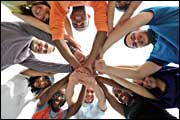Church coffee house welcomes GLBTQ youth
Massachusetts UU congregation works with other community groups to sponsor teen program.
The coffee house offers a much-needed service to area youth, said the Rev. Susan Suchocki Brown, First Church’s minister. “There are 250,000 young people in this area,” she said, referring to the north central portion of Massachusetts that encompasses three small cities and 24 towns. “Assuming that around 6 percent are gay, that’s about 15,000 kids. Until now there have been no places like this for them to go.”
The new grant will allow the program to hire a part-time director who will manage the grant, work to develop community relationships, and help train volunteers to work with the youth. In addition, it will make attending events such as conferences possible. Several of the teens will be attending a seminar in Brookline, Mass., tracing the arc of lesbian consciousness over the past 40 years. Two have even been invited to participate in a conference panel. “This grant opens the door in every direction possible for us,” said Sheila Bishop, one of the group’s main advisors and a member of First Church.
Held every Monday night, the coffee house offers time for socializing, tutoring, dinner, and a circle in which participants can talk about experiences and issues. Between 14 and 20 young people attend each week, most of whom are local high school students. None of them are official members of the church although a few have started to attend services and one even sings in the choir.
The congregation has been very supportive of the youth group. The youth group has worked with the church's Ladies Benevolent Society (founded in 1857) on creating valentines for veterans and has also worked with Meals on Wheels to make Santa Claus napkin holders for meal recipients.
First Unitarian is a Welcoming Congregation, which means that it has completed the UUA’s Welcoming Congregation program—a program helping UU congregations to become more intentionally welcoming to gay, lesbian, bisexual, and transgender people. Currently 642 out of a total of 1,022 congregations have completed this program.
Suchocki Brown, who is chaplain for the Leominster Fire Department, said that one of the events initially drawing kids to the coffee house was the death of one of their friends, Jakob Chesbrough, 16, in a fire last September. “Many of the kids in our group knew Jakob,” she said. “And they knew that they needed a safe place to be because they were in so much pain. They’d just been through this terrible loss, and they knew the church would be a safe place.”
For many of the youth, the coffee house has been a haven. Said 16-year-old Lyanne Rivera, who has been a regular at the coffee house: “Everybody who comes here has stuff going on in their life. When we come here, we make everybody feel special and not left out. Everybody is family here.”
The coffee house has been a community effort that was started through a partnership between the church and Mount Wachusett Community College, which had gotten a grant to help underserved populations. The next year, the church, through the GLBT Alliance of North Central Massachusetts, applied for a grant from the Greater Worcester Community Foundation. They received $20,000. Two of the coffee house’s youth sit on the Alliance’s board. “I really want to model that these youth are part of the success of this happening,” said Suchocki Brown.
Suchocki Brown said that she is glad that the coffee house is allowing the congregation a way of living out its commitment to being welcoming to GLBT people that goes beyond its status as a Welcoming Congregation. “One of the things that makes me so proud,” she said, “is that we are actively and institutionally demonstrating this ideal and commitment to truly being a welcoming congregation in more than name only.”
See sidebar for links to related resources.








